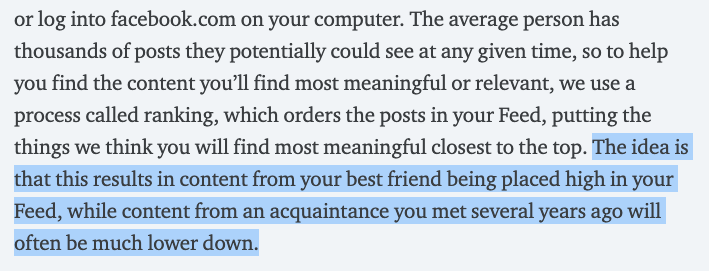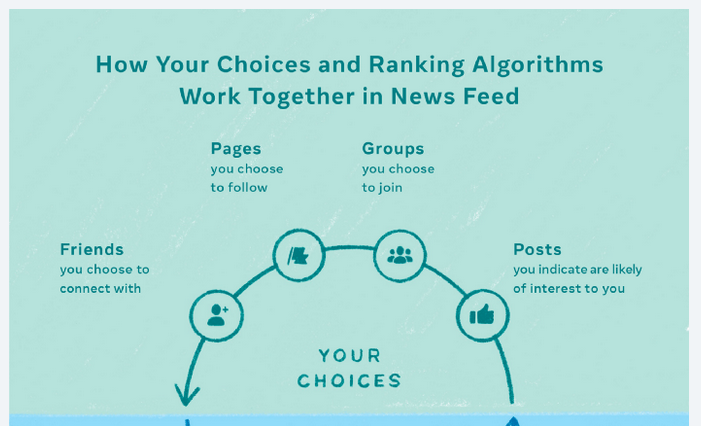
This Clegg piece is getting passed around a lot and I have thoughts about some of the things it says, which I'll provide here in a thread, featuring and responding to 10 pieces of the write-up. The following represents my personal thoughts and opinions. Sorry in advance. 1/
It starts with this recognition of the benefits of targeted advertising for the world. We know this argument - I've even made this argument before, and I referenced it recently around how tech has traditionally been built up around a call of being good for humanity 2/ 

But, as with many things, I've seen more and changed my mind. First, this isn't just "targeting," it's micro-targeting. The marginal benefits that people receive from micro-targeted ads are not worth the potential harm of those ads, how they can distort perception of the world 3/
The discourse around harmful political micro-targeting may be familiar now (blog.mozilla.org/internetcitize…) but it's broader than politics (cambridgewireless.co.uk/news/2018/aug/…). We can't just make these statements outright without evidence that shows these benefits and how significant they are 4/
Because targeted advertising isn't the only type of ad-based business model (hi, contextual ads!), and maybe not even the most effective. 5/
Also, this isn't just "a business model," it's a model that has turned companies into behemoths capable of paying billion dollar fines with ease & purchasing competitors. We're no longer talking about funding a free message board but some of the largest companies in the world 6/
So onto point 2, where the Truman Show gets a beating. I know this movie is a bit old now (if it was done today it would be about some computer sim, right?). But it still deserves accuracy in the re-telling, and Carrey's Truman had some agency 7/ 

Truman is given his ideal friends, neighbors, spouse - the studio takes in his way of interacting, and provides back foils who will compliment that. His personality (mostly) develops as it is, and as it does things are introduced to his environment in response 8/
Obstacles can be put in his way, but he's still able to get in the car & drive. Social media isn't our world, but it's a microcosm and (as Clegg admits) it's shaped to be what we need it to be, by our interactions with it. Perhaps the metaphor is more apt than the credit given 9/
So here's that point of agency- if it exists or not. And yes, there is a point where your decisions are being fed back to you, but that isn't necessarily what we want or need. I know no one who wants all their actions/choices to define their world /10 

No, instead we pick and choose. If I click on one click-baity piece about the actors in Cobra Kai, that doesn't mean I want similar stories to dominate my feed. Nor does it mean I won't be convinced to click on them again (it's clickbait), thereby reinforcing the pattern. /11
Many people still run on this "real world" model where they can do things without those things being forever tied to us. That's not the online model. There's not even an "incognito" mode on FB (for the limited value it has). What you do - all you do - is who you are /12
And sometimes that's worse than others. The predilection to hide those who you don't or wouldn't interact with much may hide a lot of people you don't want to be connected to. /13 

In my case, it hid that I was a "friend" of a genuine white supremacist - someone I went to HS with who had clearly changed his public persona in the time since I had first clicked "accept" - but I hadn't seen a single post from him in all those years to know about it /14
Our networks are vast and deep and we need exposure across them, not only where we are likely to engage most - this is the info on which we choose who get to be in those networks in the first place - a crucial part of agency /15
Here we have a (assumingly simplified) representation of the "choices" we make that shape our feed, and we can see a clear false analogy. People like, star, fav, etc content for a lot of reasons. It doesn't necessarily equate with interest. /16 

Same with groups and other things. Social grace, pressure, obligation, laziness - these are all reasons people could - and often do - interact with content they have no real interest in. Is that choice? Yes. Is it what I want defining what I get to see? Not really /17
And a word on that word I used - pressure. Some of that has been created by the platforms. Once upon a time my family wouldn't have expected me to interact with all of their posts. It was what I got to see if I happened to log in, and they'd send me the important stuff /18
Today, it genuinely is expected that certain things will be brought to my attention by the feed, and because of that we have people who expect we'll look at their photos, know what is happening in their lives. If not, for many, it's rude. These are strange dynamics. /19
Which brings me to this blatant disregard for what spam filters do - they don't block out the email your email provider thinks you won't be interested in (as much as we all may hope that they would). They're intended - expected - to block harmful or misleading content. /20 

This is a HUGE distinction. Trying to raise it as an analogy for things you may be less interested in draws comparisons that may make people think they are being done a favor, but even spam filters get it wrong, and they're much more limited in their target /21
In which we make it to the point where companies with gigantic captive user bases can, for free, conduct their own market research to make their algorithm better...and saying it's for the good of the user. Do you get a benefit? Maybe. You know who benefits more? The platform. /22
Why does that matter? Competition. Access to a steady stream of data means that any deviation from what is expected can be seen and accounted for, you can know what services you are competing with before the potential competitors have any idea. It's important to be aware /23
And that really is the goal - each company wants to be *the company forever. Of course, that's capitalism. Grow or die. But what triggers people to keep coming back? It could be trust and honest engagement. It can also be addition or (here's that word again) social pressure /24 

It's naive to assume that wanting people to keep using a product means the company that makes the product will always do what is best for them. We have examples of why this is wrong THROUGHOUT HISTORY. Cigarettes is a clear one. Or how car cos fought so hard against seatbelts /25
That means the "icky feeling" referenced earlier in the piece as a bad thing is probably a bad thing, but not necessarily a game stopper. And it shouldn't be used like it is. /26
The proposed solution? Asking people for even MORE DATA. We live in a time when data always seems to be the answer. Here it's called control, but without any indication that these answers are solely for the benefit of the person and won't be used to create better mousetraps /27 

For any solution here to really stand as meaningful, it's important for it to come with some idea that it is solely for benefit and not just another stream of data to try to benefit the bottom line. /28
And one final note - because this seems like a huge red herring. Do private messaging groups exist? Duh. Do they spread misinformation? Duh. But how do these people find each other? /29 

QAnon folks talked about using mass social media platforms to expose people to the ideas, and then they'd slowly move them to other, more extreme, less public channels. /30
Does this happen for everyone? Of course not, but many people are getting their first exposure to ideas on mass social media, and then those ideas get pushed further and further and find their way to private channels. You can't address one without the other. /31
So that's what I have. It's a small part of what I think is worth discussing here and how I think the ball is being passed between cups in a lot of ways. /32
These are important discussions, but they require honest engagement, respect for humans + their rights, and an even playing field for bringing issues to the table. And it probably needs regulation, and that doesn't have to cater to the current biz model. Dropping it there /fin
• • •
Missing some Tweet in this thread? You can try to
force a refresh



